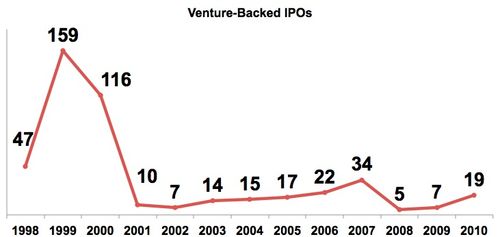Lockups and Insider Selling
There is a lot of sturm und drang out there in the worlds of social media, finacial media, and just plain media about all the lockups coming off and all the insider selling going on in some big internet stocks. As someone who has played this game a few times, I tought I'd post some thoughts about this.
First and foremost, this post has nothing to do with what USV has done, might do, or is thinking about doing with specific stocks we might own or not. That's a disclaimer for those who aren't familiar with one.
When a venture backed company goes public and is worth billions (or even hundreds of millions), the investors who provided the early capital to that company are going to be sitting on a lot of stock. They can easily own 15-20% or more of these companies. But even if they own less than 10% (as Accel Partners does in Facebook), they can be looking at billions of dollars of value.
It is an investors job to return capital. I will say that again. It is an investors job to return capital. That is how we are measured. Paper gains are fine. But at the end of the day, an investor will be measured by the amount of cash or liquid stock they return divided by the amount of cash that was invested in their fund. A multiple of three is good for a venture capital fund. A multiple of five is great. A multiple of ten is once a decade.
When an investor is looking at a single holding being worth three, five, or possibly ten times their entire fund, you can be sure they are looking to lock in that gain. That's a recipe for fantastic performance and the downside of not locking that in is a lot bigger than the upside of another one or two times their fund size.
And then there's the question of whether venture capital firms are good public market investors and whether they should be managing/holding public stocks. I don't have any hard data here, but my anecdotal data says that we are terrible public market investors. That is why many VC firms have a policy of moving the public stocks out of their portfolios as quickly as they can.
I think that is a good policy. Venture capital is about capturing the value between the startup phase and the public company phase. Others should be focused on capturing the value post the public offering.
So let's go back to the expiration of lockups and the waves of insider selling that result. This is to be expected and in fact is expected by the public markets. Look at all of the short positions that get built up in the locked up newly minted public companies in the weeks before the lockups come off. Investors know that a ton of stock is going to hit the markets and they make bets that it will impact the stock price and in most cases it does impact the stock price. As JLM likes to say "this generation did not invent sex." This has been going on since I got into the venture capital business in the mid 80s and I expect its been going on for a lot longer than that.
So to all the folks out there who are shocked and outraged at all the insider selling going on, I would suggest they park their outrage at the door of capitalism. Those who took the risk of losing all the capital they bet on 20 year old Mark Zuckerberg are entitled to their return. And they will get it. And anyone who thinks otherwise has their head in the sand.










